Which Chapter in Physics has the High Weightage for NEET 2025?
Discover the High Weightage Chapters for NEET 2025 Physics, top-scoring topics, study tips, book recommendations, and chapter-wise weightage analysis.
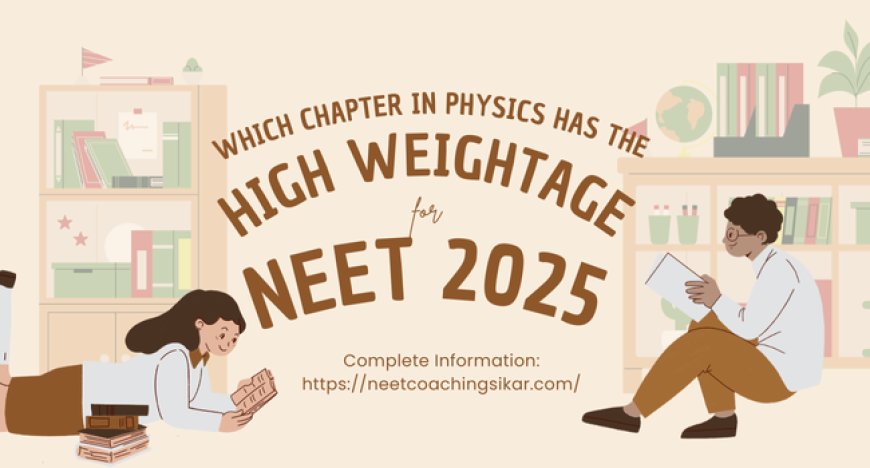
High Weightage Chapters for NEET 2025 Physics: The most widely asked doubt among NEET test takers pertains to the Physics chapter is: Which chapter in Physics has the highest weightage for NEET 2025? Students who want to achieve high scores in Physics should understand the distribution of questions in the section. Particular NEET UG Chapter-wise Weightage 2025 sections lead the standings by having both high question occurrences and strong scoring potential.
The NEET UG syllabus PDF by NTA provides complete coverage of all Physics topics but mastering Electrostatics and Current Electricity and Modern Physics will produce substantial results for NEET students. The following article explores the Physics chapters with the highest scores while demonstrating how to develop your study approach.
Which Chapter in Physics has the Highest Weightage?
The evaluation in NEET Physics shows that several chapters become crucial because experts analyze prior year outcomes. According to previous NEET exams Electrostatics along with Current Electricity Laws of Motion Ray Optics and Modern Physics remain most important due to high frequencies of questions and scoring ability. According to NEET Physics insights Current Electricity stands as the subject which grants the maximum exam weightage.
The exam features between two and three questions from this chapter because its basic nature relies on concepts and formulas. The Current Electricity serves as a potential source of 8–12 marks in the Physics section. Students can achieve high returns from this topic when they demonstrate proper preparation due to its expected appearance in exams.
It is essential for students to spend time practicing and solving problems from high-weightage topics because they lead to better examination results in NEET 2025. Knowledge mastery of designated chapters will enhance total results and boost possibilities of achieving a high standing in NEET 2025.
Also Read: 30 Day Study Plan for NEET 2025
High Weightage Chapters for NEET 2025 Physics (Class 11)
|
Chapter Name |
Important Concepts to Cover |
|
Units and Measurements |
Concepts of significant digits, types of measurement errors, and working of measurement instruments |
|
Mathematical Tools |
Binomial theorem usage, basic graphs and functions, logarithmic operations, fundamentals of differentiation and integration |
|
Motion in a Straight Line |
Understanding frames of reference, free-fall motion, 1D motion graphs, and acceleration under varying conditions |
|
Motion in a Plane |
Vector operations, vector components, projections, projectile motion, relative motion analysis, and basic circular motion |
|
Laws of Motion |
Newton’s laws and their applications, linear momentum, drawing free-body diagrams, acceleration calculations, force-friction graphs, types of friction, rocket motion, and motion in circular paths |
|
Work, Energy, and Power |
Work-energy theorem, distinction between conservative and non-conservative forces, potential energy, energy conservation, equilibrium, power, and vertical circular motion analysis |
|
System of Particles & Centre of Mass |
Center of mass calculations, head-on and angular collisions, and oblique impacts |
|
Rotational Motion |
Concepts of moment of inertia, radius of gyration, angular momentum, motion on inclined planes, and theorems related to inertia |
|
Gravitation |
Universal law of gravitation, gravitational acceleration, escape speed, satellite trajectories, Kepler’s laws, gravitational potential and potential energy, and weightlessness |
|
Mechanical Properties of Solids and Fluids |
Hooke’s law, elasticity concepts, Young’s modulus, pressure in fluids, buoyancy principles, continuity equation, Bernoulli’s principle, viscosity, and surface tension |
|
Thermal Properties of Matter |
Thermal expansion, specific and latent heat, calorimetry, conduction and radiation modes of heat transfer |
|
Kinetic Theory of Gases |
Ideal gas behavior, molecular speed types, Maxwell’s distribution law, degrees of freedom, and law of energy equipartition |
|
Thermodynamics |
Thermal equilibrium, Zeroth and First Law of Thermodynamics, thermodynamic processes, Carnot cycle, heat engines and pumps |
|
Oscillations |
Nature of periodic and oscillatory motion, simple harmonic motion (SHM), SHM equations, energy dynamics in SHM, pendulum and spring systems, liquid column oscillations |
|
Waves |
Properties of mechanical and sound waves, wave equations, principle of superposition, formation of stationary waves, and echo concept |
Also Read: NEET Cut off 2025 Predictions
High Weightage Chapters for NEET 2025 Physics (Class 12)
|
Chapter Name |
Essential Concepts and Topics |
|
Electric Charges and Fields |
Nature of electric charge, Coulomb’s Law, electric field due to continuous charge distribution, motion of charged particles in uniform electric fields, electric field lines, electric flux, Gauss’s Law and its applications, properties of electric dipoles in uniform and non-uniform electric fields |
|
Electrostatic Potential and Capacitance |
Electrostatic potential and potential difference, equipotential surfaces, potential due to electric dipole, properties of conductors in electrostatics |
|
Current Electricity |
Conductors in electrostatic equilibrium, Kirchhoff’s laws, combination of resistors, Wheatstone bridge, symmetrical circuits, electrical measuring devices, behavior of RC circuits |
|
Moving Charges and Magnetism |
Biot–Savart law, magnetic field from a circular current loop, Ampere’s circuital law and uses, force on a moving charge in a magnetic field, Lorentz force, helical motion, magnetic force on current-carrying conductors, torque on a loop, and gyromagnetic ratio |
|
Magnetism and Matter |
Bar magnet characteristics, magnetic dipole via circular loops, tangent and oscillation magnetometers, magnetisation concepts, intensity of magnetism, magnetic material types, ferromagnetism, and hysteresis loops |
|
Electromagnetic Induction |
Concept of magnetic flux, Lenz’s Law, induced electromotive force (EMF), electric field due to changing magnetic field, self and mutual inductance, Faraday’s Law, LC oscillations, transformer basics |
|
Alternating Current |
Basics of AC, average and RMS values, types of AC circuits, power factor and power calculations, choke coil usage, resonant frequency in LCR circuits, LC oscillations, and transformer operation |
|
Electromagnetic Waves |
Properties and characteristics of electromagnetic radiation |
|
Ray Optics and Optical Instruments |
Reflection from plane and curved mirrors, refraction through flat surfaces, total internal reflection, Newton’s lens formula, image formation with lens-mirror combinations, focal length via displacement method, dispersion of light, and basic optical instruments |
|
Wave Optics |
Wave behavior of light, interference patterns, diffraction phenomena, and light polarization |
|
Dual Nature of Matter and Radiation |
Quantum theory of light, principles of photoelectric emission |
|
Atoms |
Bohr’s atomic model and its implications |
|
Nuclei |
Mass-energy relation, nuclear dimensions, stability, nuclear binding energy, and basics of nuclear energy |
|
Semiconductor Electronics |
Fundamentals of semiconductors, working and applications of PN junction diodes, and basic logic gates |
Best Books for NEET Physics 2025
Students need an organized method to study for NEET 2025 since Physics offers substantial conceptual information and complex numerical problems. Students need to select superior books for NEET Physics 2025 preparation to learn all concepts from both Class 11 and Class 12 academic material. The right study materials allow students to improve their conceptual knowledge while applying that knowledge to practice problems and boost their self-assurance. Students who want to excel in Physics sections of NEET entrance exam must rely on the best books for NEET preparation in Physics with balanced explanations together with practical examples and NEET-specific MCQs. The below selection features top-rated books suitable for preparing different aspects of NEET Physics.
|
Book Title |
Author/Publisher |
Purpose |
|
NCERT Physics Textbooks (Class 11 & 12) |
NCERT |
Core concepts and NEET syllabus coverage |
|
Concepts of Physics (Vol I & II) |
H.C. Verma |
Strong theoretical base + practice questions |
|
Objective Physics (Vol I & II) |
D.C. Pandey (Arihant) |
MCQ practice + chapter-wise NEET format |
|
Understanding Physics Series |
D.C. Pandey (Arihant) |
Topic-wise in-depth coverage with examples |
|
Problems in General Physics |
I.E. Irodov |
Advanced-level problem-solving |
|
Fundamental Physics |
Pradeep Publications |
Concept explanation + NEET-style questions |
|
Physics for NEET |
C.P. Singh (Arihant) |
NEET-targeted preparation and mock tests |
|
NEET Chapterwise Physics |
MTG Editorial Board |
Previous years’ questions chapter-wise |
Correlation between Physics Most Weightage Chapters and Question Frequency in NEET
High-weightage Physics chapters form a direct connection with the number of questions which appear in NEET examinations. The subject areas of Current Electricity Electrostatics and Laws of Motion along with Ray Optics and Thermodynamics present themselves as frequent examination topics in NEET yearly. The NEET UG syllabus PDF by NTA bases its curriculum on these topics which also have substantial conceptual value and numerical considerations in the examination.
The question patterns in Current Electricity and Electrostatics remain predictable with straightforward formula applications in the exam which makes these topics highly scoring. The examination pattern of Ray Optics and Modern Physics includes two to three questions which produces attractive marks to students. The NEET UG Chapter-wise Weightage 2025 shows that these subjects gain favor from the exam panel because they contain Class 11 and 12 principles.
Students should concentrate their preparation on high-frequency topics since this strategy will lead to improved scoring results. Students who utilize H.C. Verma and D.C. Pandey as their best books for NEET preparation together with constant NEET Previous Year Questions pdf will prepare themselves for most probable examinations. Learning high-weightage NEET Physics chapters represents an important strategy to achieve better performance in the NEET Physics test.
Tips to Master High-Weightage Chapters for NEET 2025 Physics
Start with NCERT First: Students should establish fundamental knowledge by carefully studying their NCERT textbooks. The reading process requires you to highlight core formulas and definitions as well as important concepts throughout the text.
Use the Best Reference Books: You should add reputable references that supplement NCERT by using H.C. Verma's Concepts of Physics alongside references from DC Pandey Objective Physics Series and MTG 30 Years NEET Chapter-wise Solutions.
- Concepts of Physics by H.C. Verma (for theory and numerical practice)
- DC Pandey Objective Physics Series provides students with NEET-style examinations.
- MTG 30 Years NEET Chapterwise Solutions (for previous year trends)
Focus on Conceptual Clarity: Study the fundamental reasons that explain the existence of formulas together with laws. When studying Thermodynamics and Optics chapters students should push away from memorizing things by rote.
Make Chapter-wise Formula Sheets: Produce standalone pages containing essential formulae together with graphs and laws that relate to each topic in separate sections. Regular revisions of these items will help you recall them rapidly during examination time.
Practice Topic-wise PYQs: Previous year examination questions should be solved from the high-weightage chapters including Ray Optics together with Current Electricity. Determine recurring questions alongside their standard patterns for various topics.
Take Timed Chapter-wise Tests: You should take timed tests consisting of topic-focused questions to create an exam-realistic environment. Identify your problem areas followed by efforts to boost your speed alongside precision improvement.
Revise Regularly: Establish a weekly schedule for revision which you should focus more on studying weightier topics. The progress you make through time should not cause your previously acquired knowledge to disappear.
Solve Numerical Problems Daily: You need to solve problems daily within physics since it requires both conceptual and numerical problems for practice. Your emphasis should rest on both appropriate problem-solving approaches and exact methods instead of minor result values.
Use Visual Aids: Students should employ diagrams along with animations from YouTube or apps and mind maps to understand abstract subjects including Electromagnetic Induction or Circular Motion.
Clear Doubts Promptly: Don't let doubts accumulate. Students should seek clarification by talking to teachers or peers or by using available online learning platforms.
Make a schedule that follows smart study principles: Begin your study preparation with high-weightage chapters during early stages of learning. Refer to the NEET UG Chapter-wise Weightage 2025 when determining what topics to study first.
If you have any queries relating to NEET exam, be free to use the comment section displayed below on the web page. To be updated with the latest news on NEET exam 2025, read our other blogs in NEET 2025 Category. For more such informational content, keep coming to our site, NEETCoachingSikar.
What's Your Reaction?











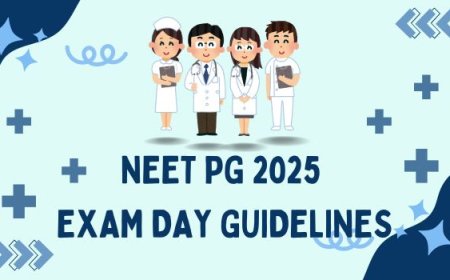


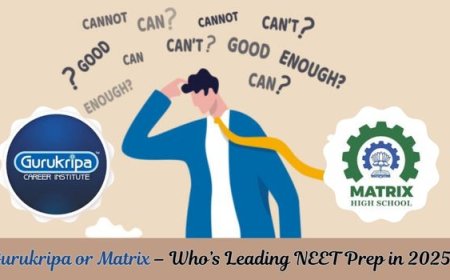
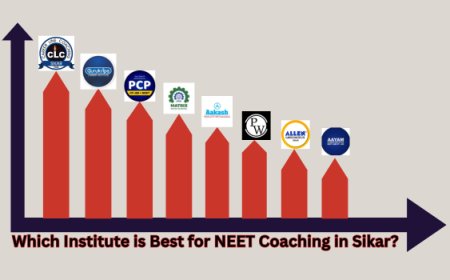
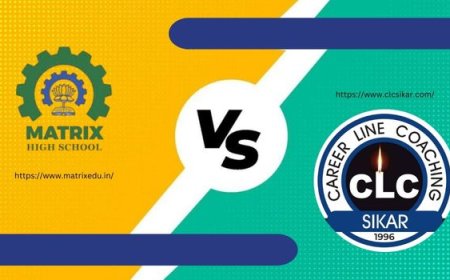
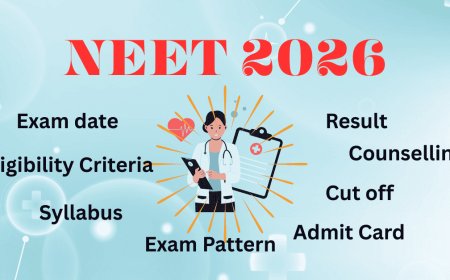
![What is the Difference Between NExT and NEET PG? [Updated 2025]](https://neetcoachingsikar.com/uploads/images/202504/image_430x256_680fd17ee9715.jpg)










![How Many Candidates Appeared in INI CET 2025? [Official Numbers Inside]](https://neetcoachingsikar.com/uploads/images/202505/image_140x98_682db1a9daa26.jpg)

